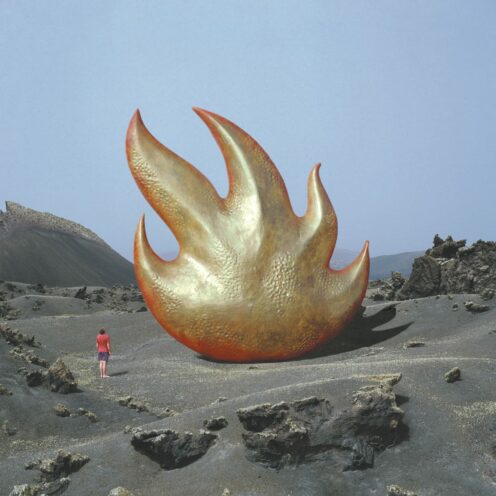
When Zack de la Rocha left Rage Against the Machine the band was at a crossroads of where to turn to next. Veteran producer Rick Rubin suggested the band reach out to Chris Cornell (of Soundgarden fame) to pursue an exploration of the two powerhouse bands together as a new one. Cornell originally was planning on writing some material for a solo project, but he found the opportunity to work with the rhythm section of Rage Against the Machine too tempting to pass up. Audioslave was born as Cornell took the opportunity to sing over some song structures the band had laid out for him to sing over. Guitarist Tom Morello recalls the first jam session in detail as he said, “”He stepped to the microphone and sang the song and I couldn’t believe it. It didn’t just sound good. It didn’t sound great. It sounded transcendent. And…when there is an irreplaceable chemistry from the first moment, you can’t deny it.” This unique combination of Rage and Soundgarden would lead to a self-titled debut album that would go on to sell over 3 million units in the U.S. alone and establish this band in the forefront of Alternative Rock radio for the better part of a decade.
The set explodes out of the gate with a rolling guitar sound by Tom Morello on “Cochise” before the rest of the band kicks in gradually and Cornell wails, “Well, I’ve been watching, while you’ve been coughing / I’ve been drinking life, while you’ve been nauseous / And so I drink to health, while you kill yourself / And I’ve got just one thing that I can offer / Go on and save yourself, and take it out on me.” It was a bold and bombastic opening single and was immediately a hit on rock radio. “Show Me How To Live” continued down a logical path of creativity of the two bands forming as one, and it featured a nice guitar groove that complemented Cornell’s vocals nicely. The chorus of, “Nail in my head, from my creator / You gave me life, now show me how to live,” was fairly simple, but with the backing power of Rage Against the Machine’s rhythm section, it just worked.
Other early standouts like “Gasoline” and the brooding “What You Are” took more of a Soundgarden approach to the songwriting, but the band’s chemistry when they joined forces was inevitable. The best track in the set comes in the form of the second single called “Like A Stone,” that features a simplistic beat from drummer Brad Wilk complemented with Tim Commerford’s bass line that allowed for Cornell to swoon above the mix. It features an all-time guitar solo from Morello in the bridge that brings the song home into legendary status.
”Set It Off” is a song that can kind of get lost in the shuffle of the expansive 14-track album, but it still demands to be taken seriously in its construction. My personal favorite on the record comes on “Shadow on the Sun,” that received prominent placement in the movie Collateral, and it showcased the song’s haunting beauty as Cornell spins a complex web of lyrical prowess. The near-perfect opening lines of, “Once upon a time / I was of the mind / To lay your burden down / And leave you where you stood / And you believed I could / You’d seen it done before / I could read your thoughts / And tell you what you saw / And never say a word / But now all that is gone / Over with and done / Never to return,” are well-crafted, poignant, and tragically haunting to the legacy that Cornell has left behind in his musical career. It’s one of those songs that grabs you from the opening notes and demands your attention to the very end.
The back half of the record does a nice job of keeping the early momentum with standout songs like “I Am The Highway,” the electronica-tinged dance floor track of “Hypnotize,” and the sprawling “Bring Em Back Alive.” While some of these brooding songs don’t have the same guttural punch of the early material, they fit in their place by rounding out the sound Audioslave was going for on their comprehensive debut. “Light My Way” is pure guitar bliss while “Getaway Car” showcases Cornell’s transcendent vocal range to the best of his abilities. By the time you’ve navigated your way to “The Last Remaining Light” you’re probably wondering why the record didn’t receive more favorable reviews upon its launch in the early 00’s. While naysayers wrote Audioslave as too much “by the books” of what Rage plus Soundgarden would logically sound like, there’s still some of the band members’ collectively best material to be found all around on this set. For now, the remaining members of Audioslave can look back fondly and with wide-eyed wonder on what they were able to achieve on this record.
 Shadow On The Sun
Shadow On The Sun